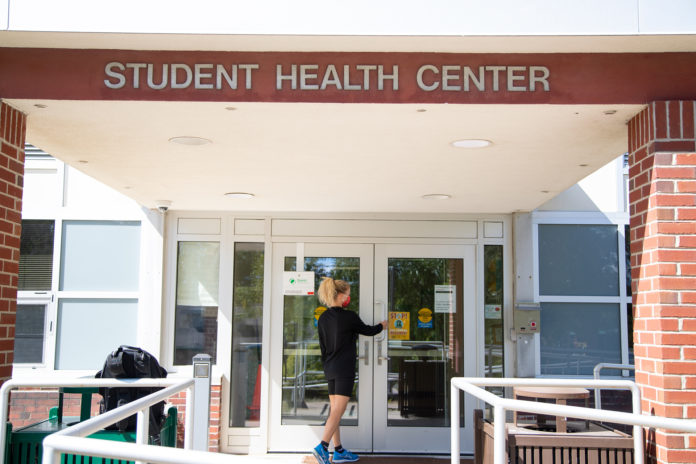Students at Slippery Rock University have returned to a more regular campus environment this fall and combatting COVID-19 has continued to be a priority for university officials.
While students can expect more in-person university events and off-campus parties, plexiglass, social distancing and even masking still continue on campus.
Pennsylvania ended its mask mandate June 28 and the university followed. However, on Aug. 16 the university reimplemented mask-wearing while inside campus buildings, regardless of vaccine status.
Other local businesses such as Giant Eagle and Sheetz have begun asking guests to wear masks as well.
Kristina Benkeser, the director of Student Health Services and a certified nurse practitioner, said the delta variant of the coronavirus’ spread and low campus vaccination rates were the main factors in requiring masks this fall.
While the university is still focused on masking, social distancing and contact tracing their main focus is getting everyone vaccinated.
The university asked students, faculty and staff to share their vaccination status to make more informed decisions with mitigation efforts. Despite offering $50 in flex credit to students who upload their vaccination card to their student health portal, only 48% of SRU students who are attending classes in-person have done so, according to Benkeser.
As for those living in the dorms, a little more than 60% of residents said they were vaccinated, Benkeser said.
In early August, the university put out a voluntary survey to all faculty and staff about their vaccination status. According to Benkeser, the survey received a 77% response rate and the results showed more than 70% of employees were vaccinated. If every non-respondent was unvaccinated, that number would drop to the 60% range.
“The staff and faculty rate is very, very good, Benkeser said. “They can be better but they’re good.”
Benkeser added that the percentage of employees who work closely with students that are vaccinated are in the 90% range.
While administers, including SRU President William Behre, have been encouraging the campus community to get vaccinated, the university and Pennsylvania State System of Higher Education has said it cannot require COVID-19 vaccines.
Instead, SRU began promoting student leaders to tell their story on why they got the vaccination in hopes to encourage their peers to become immunized.
The university has also hosted COVID-19 vaccination clinics on campus in partnership with Giant Eagle. The next clinic will take place Sept. 17 at the alumni house. The clinic will offer the Pfizer, Moderna and Johnson and Johnson vaccines.
Despite low vaccination rates in the campus community, SRU’s online dashboard has reported 41 total confirmed cases of COVID-19 since Aug. 10, with students accounting for 29 of those cases.
For students who contract the virus and live on campus, the university has set aside 87 isolation rooms throughout Buildings A through F and Watson Hall, according to Dan Brown, director of housing. If a student in either North or Rhoades Hall tests positive for COVID-19, they would have to isolate in one of those rooms for 10 days regardless of vaccination status, according to university guidelines. Students living off-campus are not able to isolate in those rooms.
If a student is exposed to someone who tests positive for COVID-19, whether or not they quarantine will depend on their vaccination status and if they are showing symptoms. Unvaccinated students will be required to quarantine for 14 days while vaccinated students will only be required to wear a mask for 14 days unless they show symptoms.
SRU is still offering asymptomatic testing by appointment at the mass testing center located in the Student Union building. Those showing symptoms will need to be tested at Student Health Services. There, staff will administer a rapid COVID-19 test via nasal swab that returns results in 15 minutes. If that test is negative, students will have to take another nasal swab to be sent off to a lab for verification.
Currently, the mass testing center and athletics department testing is handled using Shield T3 saliva collection kits. Shield T3, which is part of the University of Illinois System, has been providing the university with kits since this past spring.
Symptomatic testing is conducted through Quest Diagnostics. Both kits tests for nucleic acid from SARS-CoV-2 and are authorized for use under U.S. Food and Drug Administration Emergency Use Authorization.
Benkeser said she is not worried about whether students will follow the university’s and Centers for Disease Control and Prevention’s guidelines when it comes to COVID-19 as they are quite used to the expectations. Hearing students outside her office for the first time in over a year is welcomed return and one that she wants to keep, even if she must remind students to pull up their mask every now and then, she said.
For Benkeser, she just wants to see everyone get vaccinated to put this pandemic in the past.
“Please, please vaccinate,” Benkeser said. “Do it for you, do it for your classmates, do it for the university, do it for your family.”








